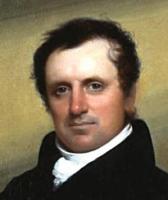The writing style of
James Fenimore Cooper
James Fenimore Cooper
1789-1851
American writer known for his historical romances of frontier and Native American life, particularly 'The Last of the Mohicans'.
James Fenimore Cooper, one of the early American novelists, is best known for his historical romances that vividly recreate the frontier life and the wilderness of early America. His narrative style, particularly in the Leatherstocking series, which includes The Last of the Mohicans, is marked by a distinctive use of language and structure that both reflects and shapes his thematic concerns.
Cooper’s prose often mirrors the expansive, untamed settings of his novels. His sentences tend to be lengthy and elaborately structured, weaving together multiple clauses and phrases. This complexity can at times slow the pace of the narrative, inviting the reader to linger over the lush descriptions of the natural landscape. His detailed depictions of setting not only serve to create a vivid backdrop but also act as a reflection of the characters’ internal landscapes and the broader American experience during the period of westward expansion.
In terms of vocabulary, Cooper’s choice of words often leans towards the archaic, which enhances the historical feel of his works. His language is formal and elevated, consistent with the literary conventions of his time. This formality, however, is occasionally breached by the speech patterns of his characters, particularly those from lower social strata or different ethnic backgrounds, who speak in dialects that Cooper renders with varying degrees of accuracy and sensitivity.
Cooper’s use of narrative techniques, such as shifting viewpoints and intrusive narrators, allows him to build a complex, multi-layered perspective on the events he describes. This approach not only enriches the narrative but also aligns with the fragmented, evolving identity of early 19th-century America.
The structure of Cooper’s novels typically follows a conventional plot progression, with clear elements of conflict, climax, and resolution. However, his stories are imbued with thematic ambiguities and moral complexities that challenge the reader to engage deeply with the text. Through his stylistic choices, Cooper crafts a narrative that is both a product of its time and a versatile medium for exploring the universal themes of identity, conflict, and society.
